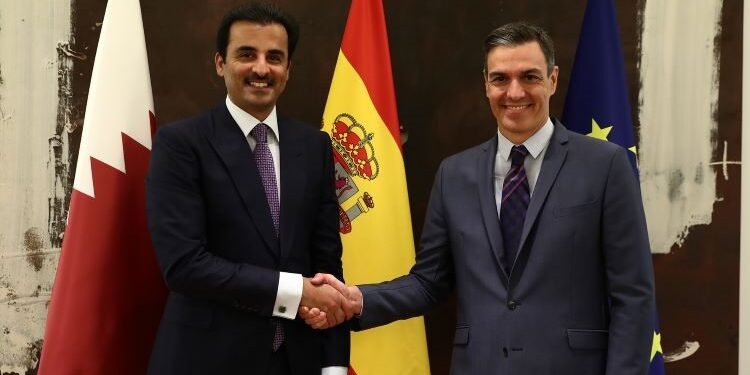Eduardo González
The President of the Government, Pedro Sánchez, will take advantage of his tour of Jordan, Saudi Arabia and Qatar to address the two-state solution in the Middle East, which would imply not only the commitment of Spain and other European countries to recognize the Palestinian State but, at the same time, At the same time, the need to convince Arab countries to recognize the State of Israel.
As reported yesterday by Moncloa sources, the main objective of this trip (Sanchez’s second tour of the region since the escalation of the Middle East conflict) will be to support a ceasefire in the Gaza Strip, a few days after the approval of a UN Security Council resolution in this regard, and the defense of the two-state solution, Israel and Palestine, that coexist in peace and security.
In the opinion of the same sources, this second step not only implies the recognition of the Palestinian State – to which Spain, Ireland, Slovenia and Malta already committed themselves in the margins of the last European Council – but also the recognition of the State of Israel by of the Arab countries. For this reason, Sánchez intends to address this step during his visit to Saudi Arabia and Qatar, two countries that have not yet recognized Israel.
Yesterday, in an informal conversation with journalists covering the trip to the region, Sánchez specified that his intention is to be able to recognize the Palestinian State before the summer, and added: “We must be attentive to the decisions that will be taken soon in Brussels and New York.”
Jordan
Sánchez moved yesterday to Jordan, where he spent the night. However, the official activity in Amman will take place today, with a meeting with King Abdullah II, a leader especially involved in the search for a solution to the Middle East conflict.
Sánchez held two recent conversations with Abdullah II. The first took place in December, by telephone, in which both demanded an immediate ceasefire in Gaza, and the second occurred a week later, during a trip by the Hashemite Monarch to Madrid, in which he was received by the King Felipe VI and Sánchez and in which he thanked “Spain’s position” in favor of a ceasefire and a two-state solution to end the conflict.
Separately, the Minister of Foreign Affairs, José Manuel Albares, traveled to Jordan on March 13, where he was also received by Abdullah II, with whom he addressed, among other issues, the situation in the Gaza Strip and the West Bank and visited a camp of refugees of the United Nations Agency for Palestine Refugees in the Near East (UNRWA).
Precisely, Pedro Sánchez will also visit today in Jordan the Jabal el Hussein refugee camp, managed by UNRWA and which hosts almost 30,000 refugees. Spain recently announced a donation of an additional 20 million euros to the UN agency despite the decision of a group of countries to freeze their contributions after a dozen agency employees (out of a workforce of 30,000) have been accused of having participated in the Hamas attacks of October 7. Jordan currently hosts 2.5 million Palestinian refugees and UNRWA provides education to more than 100,000 students in Jordan.
Furthermore, Jordan is one of the promoters of the initiative to launch humanitarian aid packages by air to the Gaza Strip in order to circumvent the blockade maintained by Israel by land. On March 27, Spain and Jordan coordinated, with financial assistance from the European Union, the airdrop of 26 tons of food to the Gaza Strip from several planes from Zaragoza.
Saudi Arabia
The tour will continue this afternoon in Saudi Arabia, where Sánchez will be received in Jeddah by King Abdullah and the crown prince, Mohamed Bin Salmán. In this country, according to the aforementioned Moncloa sources, the President of the Government will also meet with representatives of Spanish companies with interests in the country, but he does not plan to address with the Saudi authorities the decision of the Saudi group STC, announced last month September, to acquire 9.9% of Telefónica, although it would be prepared to do so in case the Saudi interlocutors raised the topic during the talks.
After the Saudi announcement, Spain decided to acquire three percent of Telefónica’s shareholding through the Sociedad Estado de Participaciones Industriales (SEPI), with the intention of reaching up to ten percent, in order to “guarantee Spanishness” and safeguard the “strategic autonomy” of the company. At the moment we are waiting for Saudi Arabia to request authorization to reach 9.9 percent, but government sources have already indicated that, whether it is rejected or accepted, the final announcement will correspond to the Council of Ministers.
José Manuel Albares also visited Riyadh last February during a tour of the Persian Gulf to address the conflict in the Middle East, in which he was received by his Saudi counterpart, Faisal bin Farhan, and by the Saudi Minister of Economy and Planning, Faisal bin Fadhil Alibrahim,
Qatar
Sánchez’s tour will conclude tomorrow in Qatar, where he will meet with the Prime Minister and Minister of Foreign Affairs, Mohamed bin Abdulrahman al Thani, and with the Emir, Tamim bin Hamad al Thani. During these meetings, the signing of a memorandum of understanding for the establishment of the Strategic Dialogue between Spain and Qatar will be discussed. Bilateral relations were elevated to the level of strategic partnership in May 2022, during a state visit of the Emir of Qatar to Spain to celebrate the 50th anniversary of the establishment of diplomatic relations. The President of the Government will also hold a meeting with Spanish businessmen with interests in this country.
Albares visited Doha in February, as part of the aforementioned tour of the Persian Gulf, to inquire about the latest contacts between the Qatari authorities and the warring parties in the Middle East. During that visit, the minister was also received by the Emir and the prime minister and head of Foreign Affairs.






